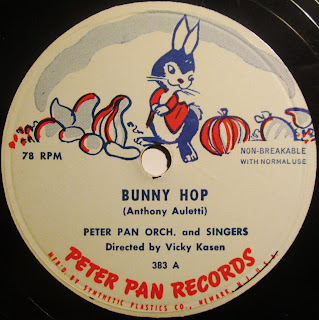Given the loving care that Diplomat (Synthetic Plastics Co.) devoted to the cover design, it's obvious that huge sales were anticipated. I mean, every detail spells "excitement," from the barely noticeable upper-margin font, "Greatest Instrumental Hits," to the square turquoise border, inside of which we find a blue border, plus green and blue font. This release screams "Buy me!" By not calling attention to itself, it, um... calls attention to itself? Wait a minute...
$2.99 at the nearest Goodwill (better than the $5.99 vinyl over at Goodwill Unlimited), and I grabbed this because 1) It was senior discount day, plus 2) I knew that these were genuine fakes. Meaning, except for the two big-font titles (which we'll have to assume were provided for this release by "Tony Vincent"), all of the rest are previously-issued Promenade label knockoffs. For-real knockoffs. The real fake deal.
Not surprisingly, I was unable to track down any previous instance of Washington Square on Promenade, even at 45cat, nor any Promenade release of More (The Theme From Mondo Cane), and so we can be reasonably sure that their release year was 1963--that these are the first (and, probably, only) pressings of these fakes. Ye olde routine of placing the titles of two current hits in huge font, with everything else in not-so-huge font--but, for once, the LP was not padded with retitled filler numbers. All but one of these were for-real instrumental hits. Fakes thereof...
We get the "Promenaders" covering the Ventures' Walk, Don't Run, and the "Promenade Orchestra" with Humoresque (and sounding for all the world like a small jazz combo with an amazing Carmen Cavallaro-style ivory tickler). I can't honestly say that I ever possessed such keyboard skills, though I could always lie. Also, there's Josh Logan (normally credited as a vocalist) apparently providing the alto sax for a swipe of Billy Vaughn's 1958 La Paloma, and a twangy guitar for his cover of Bill Justis's Raunchy. That, or else S.P.C. was being especially careless with its attributions. Nah, that's not possible...
Bert Kaempfert receives the knockoff treatment from the Promenade Orch. and Chorus for Wonderland By Night, and Bill King (Bill King?) covers Manhattan Spiritual. And the Roger Williams hit (penned by Norman Petty) Almost Paradise is knocked off by Harvey Jay, for whom this fake is Harvey's (you guessed it) sole Discogs credit.
Works for me: The perfect means by which to get clean pressings of some classic Promenade knockoffs, and at half off of the unreasonable GW price of three bucks. Of course, had this not been mono, I'd have left it in the bin (placed, as ever, on the floor), since the only thing worse than S.P.C. fake stereo is, say, Pickwick's. Anyway, despite my snarky observations, a decent group of classic instrumental hits, reasonably well simulated.
DOWNLOAD: Washington Square--Tony Vincent Orch.zip
Washington Square--Tony Vincent and His Orch., 1963?
Wonderland By Night--The Promenade Orch. and Chorus, 1961
La Paloma--John Logan, 1958
Walk, Don't Run--Promenaders, 1960
Humoresque--Promenade Orch., 1958?
More (From Mondo Cane)--Tony Vincent and His Orch., 1963?
Manhattan Spiritual--Bill King, 1959
Patricia--Jose Gonzales, 1958
Raunchy--John Logan, 1957
Almost Paradise--Harvey Jay, 1957
"Fine Records Need Not Be Expensive."--Back cover.
Lee

























